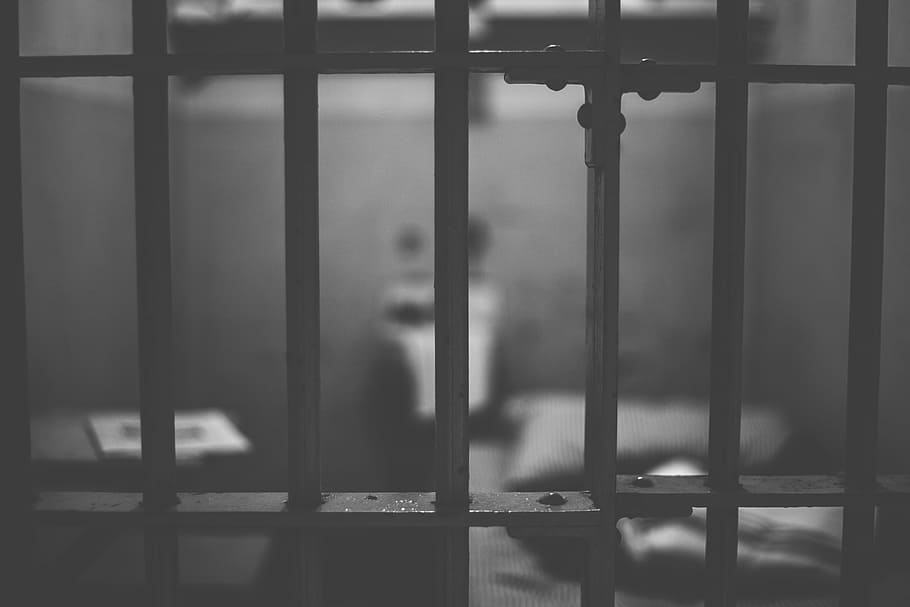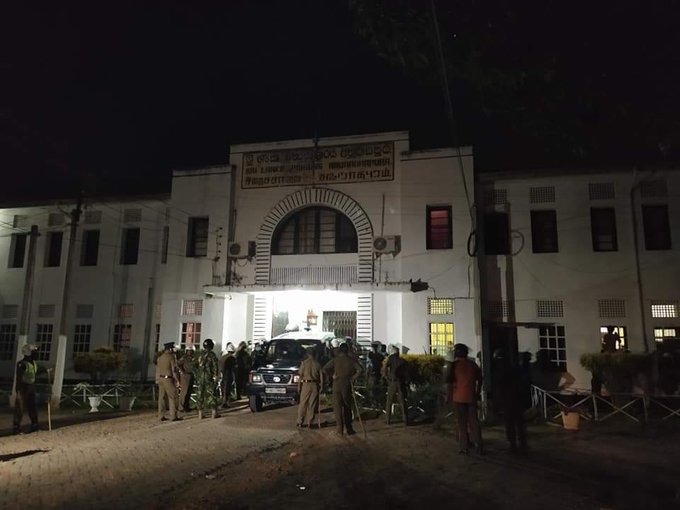
Since the COVID-19 pandemic began a number of countries around the world have released thousands of prisoners in order to stem a possible spread of the virus within prisons. According to public health experts, prisons are a ripe place for the spread of COVID-19 due to the close contact between prisoners, overcrowding and unsanitary conditions.
The pandemic has sparked protests within prisons around the world about these conditions and the restriction of prison visits, which is an essential way by which prisoners receive adequate food and clothing. In Sri Lanka, one such protest resulted in the killing of two prisoners by police officers at a jail in Anuradhapura.

Sri Lankan security forces at Anuradhapura prison last week.
The World Health Organization has issued interim guidance on how prisons could undertake measures to increase hygiene in prisons and prevent the spread of the virus but Ferreira-Borges, the WHO's prison expert, told the Guardian, "non-custodial measures should be considered at all stages of the criminal justice system."
While some countries have adopted measures increasing releases of prisoners, human rights actors do not feel they go far enough and statements have cropped up around the world in recent days calling for substantial releases and reforms. On March 25, UN High Commissioner for Human Rights Michelle Bachelet urged governments "not to forget those behind bars" and to seek to reduce the number of people in detention. "Now, more than ever, governments should release every person detained without sufficient legal basis, including political prisoners and others detained simply for expressing critical or dissenting views."
Asia
In China and South Korea which were the first countries to report mass outbreaks of COVID-19, there were large outbreaks within prisons. While it's unclear if China permitted any releases, South Korea reportedly released two inmates who tested positive for COVID-19.
In Pakistan, provincial governments and regional high courts have ordered bail to be granted to prisoners falling into a number of categories. For example, the Islamabad High Court has ordered lower courts to process bail applications for the release of all female, juvenile or elderly (over 50) prisoners, all prisoners who have served 2/3 of their sentence (except where they are a threat to public security), and prisoners who are convicted of minor offences. The court has also set out that the State should assist with bail where a prisoner is unable to meet the surety requirement. While the orders don't quite meet the call for release put out by Pakistani civil society this week, lawyers expect hundreds of prisoners to be released under these orders in the coming weeks.
In India, the Supreme Court has ordered states to consider releasing prisoners saying, "[w]hile the Government of India advises that social distancing must be maintained to prevent the spread of COVID-19 virus, the bitter truth is that our prisons are overcrowded, making it difficult for the prisoners [to do so]." A number of states have responded including, for example, Maharashtra which is looking to release over 5,000 inmates and India's largest prison, the Tihar jail, releasing over 3,000 inmates.
The government of Afghanistan has ordered the release of up to 10,000 prisoners, primarily, women, juveniles and those with pre-existing illnesses.
Meanwhile, Sri Lanka has undertaken no such releases and instead, the only special release seen in recent weeks has been the Presidential pardon of Sunil Rathnayake, a soldier convicted for the brutal massacre of eight Tamil civilians in 2000.
Middle East and North Africa
On March 3, 2020, Iran reportedly temporarily released over 54,000 prisoners who tested negative for COVID-19. They continued to release thousands more prisoners over the following weeks, as the Covid-19 pandemic spread within Iran and within the prison system. One of the prisoners released was British aid worker, Nazanin Zaghari-Ratcliffe, who was jailed in 2016 on what the United Nations, human rights actors and her family deem false politically trumped-up charges. Unlike other prisoners who have been temporarily released, according to Ratcliffe's husband she has been made to wear an ankle tag and stay within 300 metres of her parents' home in Iran.
Turkey is reportedly seeking to fast track a draft law before parliament that could see up to 100,000 inmates released, one-third of its prison population.
However, a number of other countries in the MENA region with large prison populations have taken no measures or evidently insufficient measures so far including, for example, Egypt, Syria and Bahrain.
Meanwhile, in Israel, a proposal considering releasing 500 inmates to house arrest explicitly excluded any of the 4,500 Palestinian prisoners detained in Israeli jails.
 File photograph: US President Donald Trump and William Barr meet last year.
File photograph: US President Donald Trump and William Barr meet last year.
North America
On March 26, United States Attorney General William Barr recommended federal authorities release inmates who are especially at-risk of COVID-19 and have inmates serve the remainder of their sentences via home confinement. Barr set out inmates at-risk who should be prioritized include those with pre-existing conditions and the elderly.
Already in mid-March, some American states had begun to take their own initiative to release inmates in state prisons. This week New York City announced they would be identifying individuals arrested for minor crimes and individuals vulnerable to the virus for release. Shortly after, the city released 200 inmates from jail and have another 175 planned for release. New York has been particularly badly hit by the virus and tension has reportedly been brewing in the city's Riker's Island jail complex where dozens of inmates and prisons staff have already tested positive for COVID-19.
The judiciary has also been a key actor in supporting releases with judges across the States ordering thousands of inmates to be released this past week. However, detention activists are concerned that measures have not gone far enough and prisoners remain an especially vulnerable group.
In Canada, the province of Ontario released 1,000 inmates this past week and work is being done to release more. This week, Ontario reported that an inmate and officer have both tested positive for COVID-19 in one Toronto jail.
Europe
Despite Europe being the current epicentre of the virus it has not seen the mass releases of prisoners that other parts of the world have.
In Italy where the virus has had the deadliest toll in Europe thus far, inmates at a southern Italy prison rioted in early May resulting in the deaths of 12 inmates. However, the Italian government has only gone as far as allowing for early supervised release of prisoners with less than 18 months left to serve.
England has come under increasing pressure in recent weeks from human rights activists and lawyers calling for the release of prison inmates and immigration detainees. While the Home Office was pressed into releasing 350 immigration detainees after legal action, the High Court rejected a petition calling for the release of 736 other individuals who are being detained in immigration centres. This is despite the fact that there has already been one confirmed case of COVID-19 at the Yarl Wood's immigration removal centre. Immigration activists have pointed out that the vast majority of detainees in immigration centres are asylum-seekers, not 'violent foreign offenders' as the Home Office insists.
While the British government had taken no initiative to release inmates in prisons in England, the government of Scotland has said it is actively considering options for reducing numbers in detention and may release prisoners who are reaching the end of their sentence in the coming week.
Australia
In Australia where prisons are reportedly operating at maximum capacity, despite a lack of national action on the issue, states and territories have begun introducing legislation to permit limited release of prisoners. For example, in New South Wales which has a prison population of 14,000, new legislation gives the corrections commissioner powers to release certain categories of prisoners who are vulnerable or who have committed minor offences.
However, the national government has announced no measures to address the 1,400 immigration detainees housed in prisons in Australia, or the up to 600 asylum seekers languishing in notorious offshore facilities. Among them, are many Tamil asylum-seekers. This week detained asylum seekers wrote to the Australian Prime Minister pleading for their release saying, "[w]e are sitting ducks for COVID-19 and extremely exposed to becoming severely ill, with the possibility of death."
Africa
Despite the virus not having spread as widely yet across the African continent, a number of states have been quick to act preventatively to try and reduce prison populations.
On March 25, President of Ethiopia, Sahle-Work Zewde, announced the state was granting a pardon to over 4,000 prisoners to try to stem the coronavirus spread. The WHO has only reported 12 confirmed cases of COVID-19 in Ethiopia so far but authorities in the nation have been fast to act.
On the same day, Sudan released 4,217 prisoners who tested negative for COVID-19.
On Friday, the Minister for Homeland Security of Malawi announced they would be releasing 50% of inmates in the country's prisons. The move was urged by local civil society organizations.
South and Central America
As South America braces for the full impact of COVID-19, riots occurred across prisons in Colombia last weekend resulting in the deaths of 23 prisoners after prisons stopped all prison visits. Human rights activists have called for the release of some inmates from overcrowded prisons in the country but as of yet, the government has made no firm commitments to do so.
Unlike other countries seeking to release prisoners, Brazil took the controversial decision of suspending its prison furlough system in mid-March which allowed for the temporary release of prisoners. Following this, around 1000 inmates reportedly escaped.
